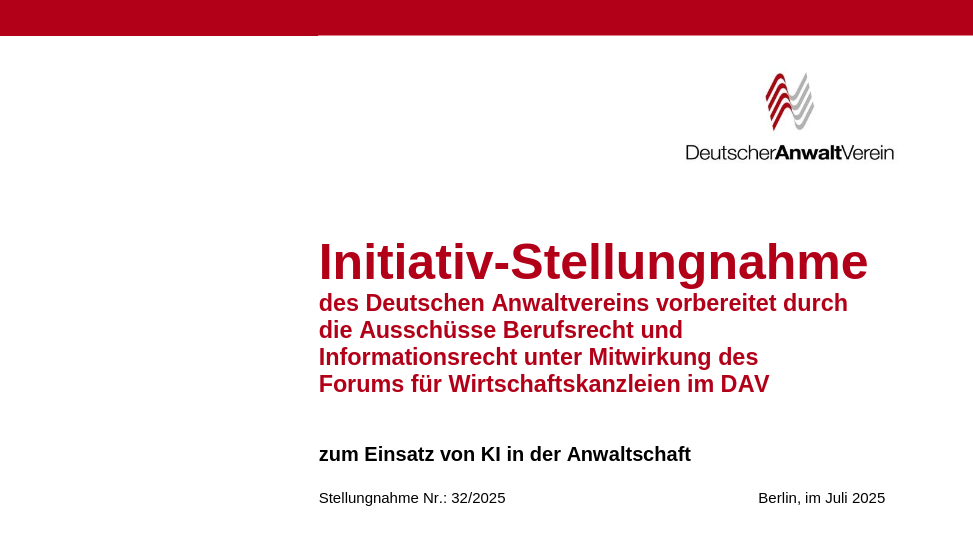DAV statement: Use of AI compatible with the legal profession

With its current statement No. 32/2025, the German Bar Association (DAV) has sent a strong signal regarding professional law: The use of artificial intelligence (AI) in law firms is not only possible, but also legally unobjectionable, provided that technical and contractual protective measures are observed. The statement removes many of the uncertainties that law firms have faced in dealing with AI and cloud services.
Legal work is changing: ever-increasing amounts of data, rising expectations for efficiency and responsiveness, a shortage of skilled workers, and increasing complexity characterize everyday life in law firms. Artificial intelligence offers solutions here—for example, in research, analysis, review, and text creation.
However, professionals bound by professional secrecy were particularly skeptical of the technology: What does the use of AI mean for the duty of confidentiality? Who is liable for errors? And what about data protection responsibilities?
The DAV's statement now provides legal certainty. It creates a clear framework for all law firms that want to upgrade their technology without violating professional law or Section 203 of the German Criminal Code (StGB).
The most important points at a glance:
-
Automated processing without plain text access does not constitute disclosure within the meaning of Section 203 of the German Criminal Code (StGB).
-
An obligation under Section 203 StGB on the part of the AI or cloud service provider is only necessary if actual disclosure takes place (e.g., in the case of plain text processing with human evaluation).
-
With Section 43e BRAO, the legislator has expressly permitted the use of external technical service providers – including in the field of AI – provided that they are contractually bound to maintain confidentiality.
-
The use of providers such as Google or Microsoft is professionally justifiable if:
- the data transfer is technically and organizationally secure,
- there is a contractual obligation to maintain confidentiality (e.g., in AVV/DPA),
- no access is granted to individuals, but rather purely technical, temporary processing takes place.
-
It is only necessary to inform the client about the use of AI if the AI makes legal assessments relevant to decisions or helps shape essential client content.
The DAV statement emphasizes: "Those who select and document carefully can use modern systems in a legally compliant manner.”
You can read about how PyleHound meets these requirements read here.
The statement is a milestone for the digital transformation of the legal profession. It shows that technological innovation and professional law are not contradictory. On the contrary, legislators and professionals have long recognized that AI systems will be standard equipment in modern law firms in the future.
Instead of blocking innovation through uncertainty, the DAV's statement creates trust, clarity, and future viability. This enables law firms to catch up technologically and continue to meet their clients' highest standards of quality, confidentiality, and efficiency.